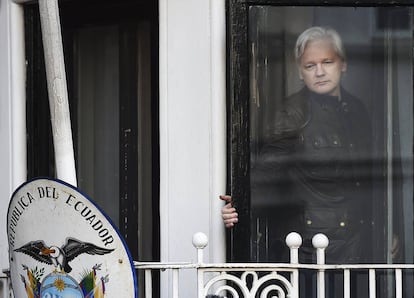Ecuador calls on Julian Assange not to interfere in the Catalan crisis
South American nation says he has “formally committed to behavior compatible with Ecuadorean State”

By getting involved in international affairs, WikiLeaks founder Julian Assange has once again compromised the country that is giving him protection.
The government of Ecuador has asked the cyber-activist not to weigh in on Catalan independence, of which Assange has been a vocal supporter on social media.
The warning does not affect the protection that Ecuador is still granting Assange
The Foreign Affairs Ministry of Ecuador has released a statement to clarify that Assange’s opinions do not represent Ecuador’s position.
“Ecuador reaffirms its adherence to the principles that guide relations among all nations, especially respect for the territorial integrity, sovereignty and independence of states, as well as non-intervention in any country’s domestic affairs, and the right of all states, as equal members of the international community, to resolve their disputes without foreign interference,” said the government in a statement.
Madrid has protested about Assange’s overt support for Catalan secessionist leaders. On November 9, Assange received a visit from Oriol Soler, a key ideologue of the independence movement. He has also given video conferences supporting Catalan independence.
According to the statement, Assange “has formally pledged to observe behavior that is compatible with the will of the Ecuadorean State.”
He has been warned about “his obligation not to make statements or engage in activities that could affect Ecuador’s international relations.” This includes relations with Spain, a country with whom Ecuador shares “historical and cultural ties.”
Last year, Ecuador cut off Assange’s internet connection to prevent him from getting involved in the US presidential elections
But Ecuador has confirmed that the warning does not affect the protection that former president Rafael Correa granted Assange in 2012. Since then, the WikiLeaks founder has been living inside the Ecuadorean embassy in London, where he fled to avoid extradition to Sweden on rape charges that have since been dropped.
The government of Lenín Moreno, who assumed office in May of this year, has reaffirmed its commitment to provide Assange with diplomatic asylum.
In late September, however, the president said in an interview that Assange might be going too far, and asked him not to get involved in either national or international politics.
The Latin American government has asked Britain to issue safe-conduct so that Assange may leave the embassy and travel to Ecuador. But the activist refuses to leave out of fear that he will be extradited to the US over WikiLeaks’ release of secret military and diplomatic cables in 2010.
Last year, Ecuador cut off Assange’s internet connection to prevent him from getting involved in the US presidential elections, after WikiLeaks released emails that compromised Hillary Clinton’s run for the presidency.
English version by Susana Urra.
Tu suscripción se está usando en otro dispositivo
¿Quieres añadir otro usuario a tu suscripción?
Si continúas leyendo en este dispositivo, no se podrá leer en el otro.
FlechaTu suscripción se está usando en otro dispositivo y solo puedes acceder a EL PAÍS desde un dispositivo a la vez.
Si quieres compartir tu cuenta, cambia tu suscripción a la modalidad Premium, así podrás añadir otro usuario. Cada uno accederá con su propia cuenta de email, lo que os permitirá personalizar vuestra experiencia en EL PAÍS.
¿Tienes una suscripción de empresa? Accede aquí para contratar más cuentas.
En el caso de no saber quién está usando tu cuenta, te recomendamos cambiar tu contraseña aquí.
Si decides continuar compartiendo tu cuenta, este mensaje se mostrará en tu dispositivo y en el de la otra persona que está usando tu cuenta de forma indefinida, afectando a tu experiencia de lectura. Puedes consultar aquí los términos y condiciones de la suscripción digital.









































